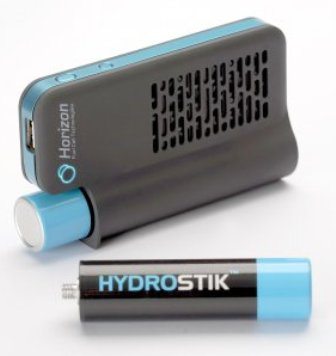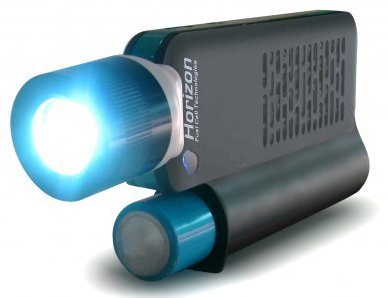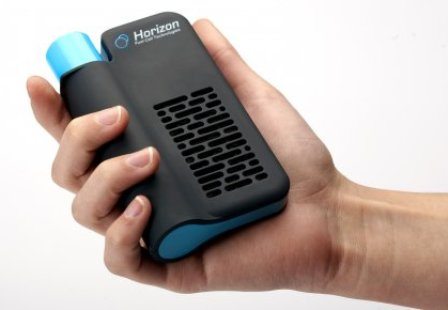The $100 Horizon MiniPak personal power plant produces electricity from hydrogen at the point of use and offers effectively unlimited run-time for personal electronics. It will almost certainly be the public’s first experience of the coming Hydrogen Economy.

It’s the first fuel cell product to compete on cost with both disposable and rechargeable batteries with just one refillable cartridge supplying as much power over its life as 1000 disposable AA alkaline batteries. It’s also 100% recyclable, uses no heavy metals and there are no toxic liquids involved.
Specifically designed for portable consumer electronics, the MiniPak offers unlimited portable power for your cellphone, smartphone or personal media device. At higher production levels, prices are expected to drop to $30, with fuel cartridge prices eventually comparable with disposable alkaline batteries, and refilling costs of just a few cents.
The MiniPak delivers 1.5 to 2W of continuous power using a standard USB port, and uses refillable fuel cartridges with up to 12Wh of energy. It is designed to extend the charge of small portable electronics. Although the Minipak’s capability is limited to small devices, it is effectively a miniature-scale power plant that produces electricity directly from hydrogen at the point of use.
The MiniPak uses a combination of Horizon’s mass-produced PEM fuel cells and a new low-cost metal hydride storage solution, which is able to store hydrogen safely as a dry, non-toxic and non-pressurized material. The fuel cartridge contains a metallic sponge that is able to absorb hydrogen and turn it into a solid hydride. It is then able to release it back to the fuel cell when needed. The PEM fuel cell combines oxygen from the air with the stored hydrogen – electricity via its USB port and trace amounts of water vapor.

Similar to a pocket-size distributed energy system, it avoids the energy losses that occur between the power plant and the battery operated devices that we charge from powerpoints. Cumulatively, these losses are massive. There are roughly 10,000 power plants in the US with an average thermal efficiency of 33%, and transmission losses of around 5-10%. When it comes to portable electronics, the US Environmental Protection Agency estimated that in 2004 in the US alone, there were 2.5 billion AC to DC power adapters consuming 207 billion kWh per year or up to 6% of the US$247 billion national electric bill. It is further estimated that 6 to 10 billion similar devices are presently in use worldwide, operating at an energy efficiency of around 50%. Whereas the MiniPak is not applicable to all AC to DC powered devices, it can indeed participate in reducing billions of dollars of wasted energy costs.
Besides contributing to overall efficiency, Horizon’s new micro-fuel cell system offers numerous environmental benefits. Just one of its Hydrostik fuel cartridges can deliver the same amount of power over its lifetime as over 1000 disposable alkaline AA batteries, while storing more energy at a lower cost. In addition, the cartridges do not contain any toxic materials and can be completely recycled, using conventional methods.
“Over the past 4 years, Horizon has brought to market several award-winning products to retail environments in over 60 countries around the world. As these were primarily toys, few have realized the implications of these first products. They have in fact enabled Horizon to become the world’s largest volume producer of micro-fuel cells, and placed the company in a prime position to begin mass-commercialization into other new markets, including portable electronics. Our global market experience and mass-production are already in place, and with costs competitive to disposable batteries, Horizon’s refillable fuel cell products shift the paradigm”, noted Taras Wankewycz, Founder and Chief Marketing Officer.

The MiniPak is Horizon’s first portable fuel cell product to enter the market, while several others are currently under joint development with various large-scale global market leaders. Horizon is also scaling up the size of the solutions, since they offer the promise of storing renewable energy in larger quantities with no self-discharge and at a lower cost than batteries, therefore opening a path towards independent, distributed energy in homes, businesses and other industrial applications.
Published on Jun 18, 2010





